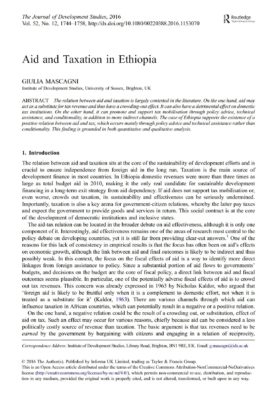The Journal of Development Studies Volume 52
The relation between aid and taxation is largely contested in the literature. On the one hand, aid may act as a substitute for tax revenue and thus have a crowding-out effect. It can also have a detrimental effect on domestic tax institutions. On the other hand, it can promote and support tax mobilisation through policy advice, technical assistance, and conditionality, in addition to more indirect channels. The case of Ethiopia supports the existence of a positive relation between aid and tax, which occurs mainly through policy advice and technical assistance rather than conditionality. This finding is grounded in both quantitative and qualitative analysis.
